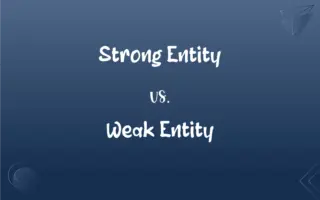Monosaccharides vs. Polysaccharides: What's the Difference?
Edited by Janet White || By Harlon Moss || Updated on October 26, 2023
Monosaccharides are single sugar molecules, while polysaccharides are complex carbohydrates composed of multiple sugar units.

Key Differences
Monosaccharides stand as the simplest form of carbohydrates, characterized by single sugar molecules. In contrast, polysaccharides represent complex carbohydrates, housing multiple monosaccharide units through glycosidic bonds. When envisioning monosaccharides, one should consider glucose and fructose, sugars directly absorbed into the bloodstream during digestion.
However, polysaccharides, like starch or cellulose, undergo a breakdown into simpler sugars for absorption. The solubility of monosaccharides in water is generally higher, facilitating their sweet taste.
Polysaccharides, on the other hand, might be insoluble and lack the characteristic sweetness of simpler sugars. Monosaccharides play a pivotal role in energy provision, while polysaccharides, given their complex nature, serve as energy storage units or provide structural support in plants.
Comparison Chart
Basic Definition
Simple sugars
Complex carbohydrates
Number of Sugar Units
Single
Multiple
ADVERTISEMENT
Solubility in Water
Generally high
Can vary, often lower
Taste
Sweet
Typically not sweet
Role
Immediate energy
Energy storage or structural support
Monosaccharides and Polysaccharides Definitions
Monosaccharides
Simplest carbohydrates consisting of one sugar molecule.
Glucose is one of the most common monosaccharides.
Polysaccharides
Serve as long-term energy storage or structural molecules.
Cellulose, a polysaccharide, gives structural strength to plant cell walls.
ADVERTISEMENT
Monosaccharides
Water-soluble, crystalline compounds.
The sweet taste of honey is attributed to monosaccharides like glucose.
Polysaccharides
Can be branched or linear chains of sugars.
Glycogen is a branched polysaccharide stored in animal tissues.
Monosaccharides
Directly absorbed into the bloodstream.
Consuming monosaccharides provides instant energy.
Polysaccharides
Formed by glycosidic linkage of numerous sugar units.
Polysaccharides break down into monosaccharides during digestion.
Monosaccharides
Sugars that cannot be hydrolyzed to a simpler form.
Fructose, found in fruits, is a monosaccharide.
Polysaccharides
Carbohydrates composed of multiple monosaccharide units.
Starch, found in potatoes, is a polysaccharide.
Monosaccharides
Building blocks for more complex carbohydrates.
Several monosaccharides join together to form polysaccharides.
Polysaccharides
Often insoluble in water and lack the sweet taste.
Polysaccharides in plant fibers contribute to dietary roughage.
Monosaccharides
Any of several carbohydrates, such as tetroses, pentoses, and hexoses, that cannot be broken down to simpler sugars by hydrolysis. Also called simple sugar.
Polysaccharides
Any of a class of carbohydrates, such as starch and cellulose, consisting of a number of monosaccharides joined by glycosidic bonds.
Monosaccharides
Plural of monosaccharide
Polysaccharides
Plural of polysaccharide
FAQs
What are monosaccharides made of?
Monosaccharides are simple sugars made of a single sugar molecule.
What role do polysaccharides play in plants?
Polysaccharides can serve as energy storage (like starch) or provide structural support (like cellulose).
Are monosaccharides sweet in taste?
Yes, monosaccharides generally have a sweet taste.
How are polysaccharides formed?
Polysaccharides are formed by the linkage of multiple monosaccharides.
Do monosaccharides play a role in energy provision?
Yes, monosaccharides are directly absorbed into the bloodstream and provide immediate energy.
Are polysaccharides digestible by humans?
Some polysaccharides, like starch, are digestible, while others, like cellulose, aren't.
Do both monosaccharides and polysaccharides play a role in nutrition?
Yes, both provide energy, with monosaccharides offering immediate energy and polysaccharides serving as longer-term energy sources.
Can polysaccharides be used in industry?
Yes, certain polysaccharides like cellulose are used in various industries, including the production of paper.
Do fruits contain monosaccharides?
Yes, fruits often contain monosaccharides like fructose.
Are monosaccharides important in metabolism?
Yes, monosaccharides like glucose play a central role in cellular metabolism.
Which is more complex, monosaccharides or polysaccharides?
Polysaccharides are more complex than monosaccharides.
Where is the polysaccharide glycogen stored?
Glycogen, a polysaccharide, is stored primarily in the liver and muscles of animals.
Are all monosaccharides identical?
No, there are different types of monosaccharides like glucose, fructose, and galactose.
How do organisms use polysaccharides?
Organisms use polysaccharides for energy storage, structural support, or as protective barriers.
Do plants store energy in the form of polysaccharides?
Yes, plants store energy in the form of the polysaccharide starch.
What are some examples of polysaccharides?
Starch, cellulose, and glycogen are examples of polysaccharides.
Can monosaccharides be broken down further?
No, monosaccharides are the simplest form of carbohydrates and cannot be hydrolyzed to a simpler form.
How do monosaccharides differ in structure from polysaccharides?
Monosaccharides have a single sugar unit, while polysaccharides have multiple sugar units linked together.
Which is more soluble in water, monosaccharides or polysaccharides?
Monosaccharides are generally more soluble in water than many polysaccharides.
Can polysaccharides taste sweet?
Generally, polysaccharides do not have the sweet taste characteristic of monosaccharides.
About Author
Written by
Harlon MossHarlon is a seasoned quality moderator and accomplished content writer for Difference Wiki. An alumnus of the prestigious University of California, he earned his degree in Computer Science. Leveraging his academic background, Harlon brings a meticulous and informed perspective to his work, ensuring content accuracy and excellence.
Edited by
Janet WhiteJanet White has been an esteemed writer and blogger for Difference Wiki. Holding a Master's degree in Science and Medical Journalism from the prestigious Boston University, she has consistently demonstrated her expertise and passion for her field. When she's not immersed in her work, Janet relishes her time exercising, delving into a good book, and cherishing moments with friends and family.






































































